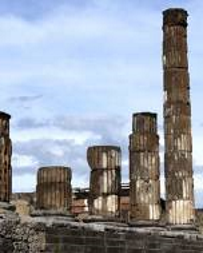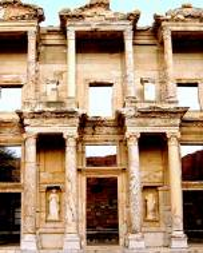Barcelona
The 1992 Summer Olympics revealed to the world what Europeans and seasoned travelers already knew - Barcelona is one of the world's greatest treasures. Vibrant and earthy, commercial and cultural, this city of two million residents is the capital of Spain's autonomous region of Catalonia. Stroll along the wide, tree-lined promenades of Las Ramblas and marvel at the spires of Gaudi's Basilica La Sagrada Familia. Or visit the former Olympic Ring on the hill of Montjuic - also home to world-class parks, fountains and museums. Barcelona, which nurtured such artistic giants as Picasso, Dali, Miro and Casals, is definitely a traveler's paradise.
Toulon has been the great bastion of the French navy since 1494, when Charles VIII chose its superb harbor as the site for a naval shipyard. Today, Toulon is homeport for the French navy's nuclear-powered aircraft carrier "Charles de Gaulle." The city is also the capital of the Var and provides an excellent gateway to the riches of Provence and the Cote d'Azur. To the north and west are medieval Provencal hilltop villages and superb vineyards. To the east lie the fabled coves and beaches of the Cote d'Azur, the setting for the legendary resort of St. Tropez. And everywhere there is the miraculous fusion of sky and sea that forms the essence of Southern France.
Toulon's Upper Town bears more than a strong resemblance to Paris - in the 1840s, the prefect of the Var was that same Baron Haussmann who gave the City of Light its elegant boulevards and architecture. Haussmann first tried his hand at urban renewal here in Toulon.
Florence/Pisa (Livorno), ItalyLivorno is the gateway to glorious Tuscany. Visit Florence - the cradle of the Renaissance - home to the Duomo, the Uffizi and the Ponte Vecchio. Here the Medici fostered a city-state whose cultural legacy is as great as classical Athens. Giants like Dante, Da Vinci, Michelangelo and Galileo infused the West with a new creative spirit. Then there is Pisa, Florence's rival for political power. Pisa, a brash, commercial seafaring town rivaled the great maritime powers of Venice and Genoa. The city was a leader in art and architecture second only to Florence.
Rome (Civitavecchia), Italy
Your gateway to the Eternal City, Civitavecchia has served as Rome's seaport since the 13th century. The port has a long and venerable history. The emperor Trajan built a pleasure villa near the modern city, while Bernini and Michelangelo designed the harbour fortifications.
Yet the Eternal City eternally beckons. The ancient capital of the Western World and the centre of Christianity for nearly 2,000 years, Rome provides an inexhaustible feast. Visit the ruins of the Forum, view the splendours of the Sistine Chapel, or climb the Spanish Steps, once the heart of Rome's Bohemian Quarter.
Rome has been a magnet luring the world's greatest artists, architects, and philosophers since the days of the Caesars.
Naples, Italy (for Capri & Pompeii)
Italy's third-largest city, Naples is a bustling metropolis famed for it stately buildings, crowded streets, pizza - and notoriously bad traffic. However, this beautiful city is rich in centuries-old culture and customs. Naples is also your gateway to the Isle of Capri, the fabled Amalfi Coast and the ruins of Pompeii, buried in ash by the cataclysmic eruption of Mt. Vesuvius in 79 A.D.
Naples boasts an ideal location, with both the ruins of Roman cities and the stunning Amalfi Coast in easy reach.
Thanks to its proximity to the mainland, Mykonos was one of the first Greek islands to become an international travel destination. During the late '60s and early '70s, Mykonos was famed as a haunt for the rich. The island's nightlife - then and now - was a glittering whirl of coloured lights, music, and parties. But there's another side to Mykonos - the neighbouring island of Delos. In classical mythology, Delos was the birthplace of Apollo and his twin sister Artemis. Travellers to Delos can stroll among the island's vast ruins, which include three temples consecrated to the Sun God and the famed Lions Walk.
Mykonos town features hip boutiques, restaurants, jewellery stores, souvenirs, taverns and cafés. The island's famed windmills are found just south of the waterfront.
Istanbul, Turkey
Istanbul rises from the Bosphorus, a vision of minarets and domes sparkling in the light. The capital of vanished empires, Istanbul is a true crossroad, the only city on Earth to span two continents. This meeting place of Europe and Asia, of Christian and Muslim, is one of the great adventures a traveller encounters. Browse the stalls of the world's largest bazaar, explore ancient mosques and churches, and gaze at the stunning jewels in the Topkapi Palace.
Istanbul has dominated the Straits of Bosporus for 25 centuries. As Constantinople, capital of the Eastern Roman Empire, it was a metropolis of stunning splendour when the great cities of Europe were mere villages.
From the port of Kusadasi on Turkey's Anatolian Coast, one travels into the past. Nearby stand the ruins of ancient Ephesus, a major site of archaeological excavation. The city was once a Roman provincial capital and trading centre. Ephesus is also home to several of Christendom's holiest sites. St. Paul preached at the Great Theatre and the ruins of Ephesus' Basilica cover the tomb of Christ's most beloved disciple, St. John the Apostle.
In Kusadasi, whitewashed stone houses rise in tiers behind the market district. The palm-lined esplanade is the centre of town life, with thousands of merchants offering wares to rival the Grand Bazaar in Istanbul.
The past maintains a vibrant presence in the cradle of Western civilization. Atop the Acropolis, the serene Parthenon sails above the commotion of the modern city. The tragedies of Aeschylus, Sophocles, and Euripides were performed in the Theatre of Dionysus at the foot of the Acropolis. On Pnyx Hill, citizens of a fledgling democracy gathered to cast their votes on Athens' destiny. Then there is the hustle and bustle of the modern city, a metropolis of 4.5 million that spreads out from the foot of Mt. Lycabettus and across the plain. Packed with busy shops and lively tavernas, modern Athens is a colourful counterpoint to classical Greece.
Piraeus is the port city for Athens and has been Athens' port of entry for over two millennia.
Venice, Italy










No comments:
Post a Comment